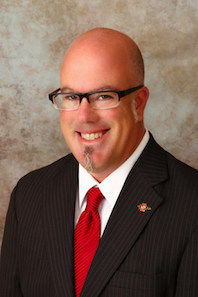Music Career Finder
Survey Start
Band Director
Career Overview
Band Directors oversee rehearsals and performances for a school’s athletic bands, including marching bands and pep bands. They also handle behind-the-scenes duties such as recruiting and budget planning.
Alternate Titles
Director of Athletic Bands, Associate Band Director
Avg. Salary
$50,3531
Salary Range
$38K-$71K1

How To Become a Band Director
- Career Description
- Salary
- Career Outlook
- Career Path
- Experience & Skills
- Education & Training
- Additional Resources
- Sources
- References
Career Description
Bryan “Coach” Ransom is the Director of Athletic Bands at San Diego State University. A Band Director is often associated with marching bands, however, they work with many different athletic bands and have many responsibilities outside of rehearsals and performance.
Ransom tells us, “A typical day starts with answering email, recruiting correspondence, and drafting rehearsal schedules for any bands that are rehearsing that day. After consulting with the Marching Aztecs instructional staff and drafting the schedule, I post that schedule for students on our private Facebook page, always by or before 10 am.
“Our marching rehearsals are from 4 pm to 5:50 pm Monday, Wednesday, and Friday. The Pep Band (Men’s Basketball Band) rehearses Wednesday evenings and the Varsity Band (Women’s Basketball Band) on Monday evenings. We have a number of campus and community events and games that we perform for on any given week. I am the administrator for the Athletic Bands so there are always invoices to submit, purchase orders to create, staff timecards to manage, etc.”
“I’m also involved in live entertainment production for the Super Bowl, College Football Playoff, and other live events throughout the year. I don’t have a lot of ‘downtime’ in the fall!”
Salary
On average, Band Directors earn approximately $50,400 annually. The salary range for Band Directors runs from $38,000 to $71,000.
Band Directors receive a regular salary with paid time off and benefits. How much they earn will depend on their employer. For example, a Big Ten school with a large athletic department and School of Music would have a higher budget for compensating their Band Director than a high school or small college.
Hey, what do you think about trying our new Music Career HelperMusic Career Helper really quick? It’s totally free and could help get your career moving fast! Give it a try. It’s totally free and you have nothing to lose.
Career Outlook
Since it’s such a unique position, the work lifestyle of a school’s Band Director requires a lot of travel and work hours outside of the more 9-5 schedule of many other faculty members.
Ransom explains, “Though my position is housed in Athletics, I am also a Lecturer in music for our School of Music and Dance. My office is housed in the music building but I typically make the walk over to the athletics administration building a few times per week for meetings. This allows me to stay connected with the music faculty and music majors, many of whom perform with the Athletic Bands.
“It is rare from August through April for me to not have a gig or event on the weekends but when I do, I enjoy spending it with my wife of twenty-three years, Christina, who I met when we were both members of the Marching Aztecs and my eighteen-year-old daughter Alysa, who is currently attending SDSU and is on the cheer squad.”
Career Path
Attaining a position as a Director of Athletic Bands is a competitive venture. Often candidates for these roles are already on staff at the university’s School of Music as Lecturers or Professors.
They may be hired in a couple of roles, depending on the size of the school and its band program — Assistant Director and Director. After landing one of these positions, a Director could conceivably advance in his or her career by seeking a position with a college or university with a larger program and therefore a higher salary.
“I have two supervisors: the Associate Athletic Director and the Director of the School of Music and Dance. Both are very supportive of my unique position within the framework of the University,” Ransom says.”
“I consider myself extremely fortunate to hold this position within the University with supportive supervisors and colleagues. I have been at SDSU now for thirty years, including my time as a student. I was appointed Director of Athletic Bands in 2003 and I can honestly say there is no other place I’d rather be. I am, as expressed in one of our taglines, an Aztec4Life.”
Aspiring Band Directors should be aware that they must put in time as a music educator for many years before they’d be likely to be considered as a candidate for an available Director job.
“I am an anomaly,” Ransom cautions. “If your expectation is to land a full-time university job after graduation from college it’s probably not going to happen. Most job openings for University Band Director positions have minimum requirements of graduate or doctoral degrees and most will also list as ‘preferred’ a certain amount of time spent in the public or private schools. If that is someone’s goal, they really need to plan on putting that time in.”
- Expose yourself to all types of live music and dance performances.
- Offer your services as a marching or movement technician at a local high school.
- Perform on a secondary instrument for part of the year (concert season).
Experience & Skills
“To be a successful Band Director, you first need a solid foundation of music performance and music theory,” Ransom says. “I see more and more high schools able to add theory into their ensemble time. I have found the best Directors, those who get the most out of their students’ potential, are very good musicians themselves. There is a direct correlation between mastering your instrument and the ability to pass that knowledge along to your students regardless of the instrument they play.”
“Organizational and time management skills are very important,” Ransom explains.
“You also need to be able to set clear, attainable goals for your students and your program from day one. This involves the ability to assess the strengths and weaknesses of the group and program music and marching drills that are currently appropriate for them. One also needs to exude encouragement and positivity, while avoiding false praise. Exclaiming ‘that sounded good’ to a band when it really didn’t sends a confusing message. I hear it all the time.”
Education & Training
Band Directors hold undergraduate and graduate degrees in music-related areas: Music, Music Education, and Music Performance are all solid choices.
“Anyone who is serious about becoming a Band Director should try to expose themselves to different programs and approaches,” Ransom says. “Most students go through their high school years only really knowing one ‘way’ to do things. Students need to get out and experience other programs.”
“Schedule visits at local high school evening rehearsals; most Directors would be happy to let future Band Directors observe. One also must become the best student possible on their particular instrument. I would encourage private lessons outside of school. To become an accomplished teacher, you must first be an accomplished student. Take notes in your lessons. Think about how to impart what you have learned into teaching a full ensemble.”
Additional Resources
Aspiring Band Directors should check out The College Band Directors National Association for relevant conferences, resources, and member opportunities. Ransom also recommends a couple books. “The Dynamic Marching Band by Wayne Markworth is an excellent ‘all inclusive’ resource book for new Band Directors,” he says. “The System: Marching Band Methods by Gary E. Smith is another fantastic resource textbook.”
Sources

Bryan “Coach” Ransom
Director of Athletic Bands Bryan “Coach” Ransom has been with San Diego State University’s bands since 1988. He graduated from SDSU in 1993. He directs and coordinates the Marching Aztecs, Pep Band (Men’s Basketball Band), Varsity Band (Women’s Basketball Band) and SDSU Winterguard.
In addition to his work with SDSU, he was previously employed by the San Diego Chargers as Stage Manager and On-Field Entertainment Coordinator. He has also worked on Super Bowl Pregame, Halftime, and Postgame shows, NFL Kickoff, Pro Bowl, and Thanksgiving Day Pregame and Halftime Shows, Major League Baseball All-Star games and Opening Day Ceremonies, Davis Cup and Fed Cup International tennis matches, Major League Soccer events, the College Football Playoff National Championship Game, NCAA Championships events, and feature films.
He holds a Bachelor of Arts Degree in Music (with an emphasis in percussion) and Professional Teaching Credential from San Diego State University.
His career has been covered by the Chicago Tribune and The San Diego Union-Tribune.
References
- 1Multiple. "Band Director Salaries in United States". Glassdoor. published: Dec 14, 2019. retrieved on: Dec 16, 2019